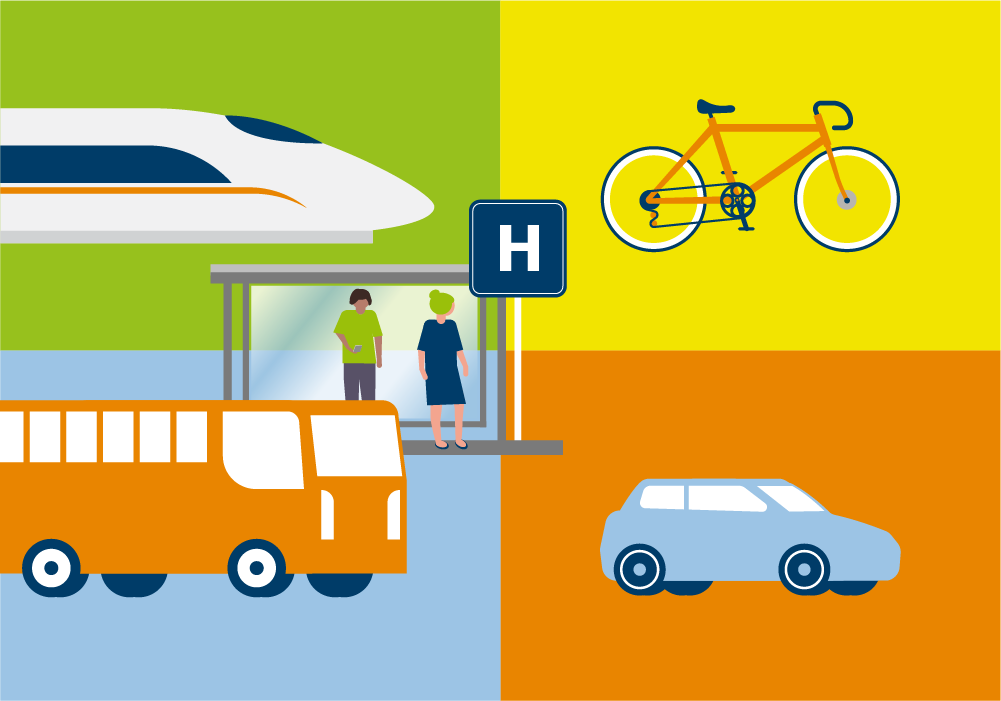Mobility Monitor survey: Germans take climate protection in transport seriously and want changes to be made

Munich, 13 February 2023
According to respondents, five of the top ten drivers for climate protection concern the area of transport – first and foremost expanding public transport (71%). Two thirds of those surveyed rate the EUR 49 ticket (unlimited travel throughout Germany on local public transport for 49 euros per month) highly. One in four would consider buying an electric vehicle. These are results of the “acatech Mobility Monitor”, a representative population survey undertaken by the Allensbach Institute on behalf of acatech – National Academy of Science and Engineering. The survey reveals that although willing to change people have some reservations, with marked differences between urban and rural, East and West, rich and poor.
The pace of progress in climate protection in transport will only increase if technological innovations go hand in hand with better conditions for personal mobility and goods mobility – and both also meet with acceptance in the population. For that reason, the representative Mobility Monitor, now in its fourth year, looks at developments in mobility behaviours in the population, people’s willingness to change and their degree of acceptance of electric mobility.
All materials (charts, press release, summary of results) relating to the study can be found on our dedicated Mobility Monitor page (in German).
This latest stocktaking exercise on the basis of a representative survey of the population reveals that German people have not put climate protection to the back of their minds despite the current crises, and that they consider the transport sector to have a key role in reducing climate impacts. In particular, people want to see the expansion of local public transport (71%), a greater shift in goods transport to rail and water (67%), low-emission drive systems (63%) and alternative fuels such as hydrogen (62%). These figures are higher compared with similar questions posed in the years 2019–2021.
61 per cent are confident that technological progress in general can contribute greatly to climate protection. The pandemic temporarily changed mobility greatly. However, many would also like to cycle more in the future (30%) while almost one in five would like to use their car less.
The car is still by far the most important means of transport: 47 per cent drive every day, a further 23 per cent more than once a week; 18 per cent cycle every day and a further 25 per cent more than once a week. More and more people cycle frequently while car use is down slightly. For 72 per cent of the population the car is essential, followed by bicycle (51%) and public transport (42%). There is a major urban/rural divide.
23 per cent of car users regard local public transport as a real alternative to their car. This figure is lower in East Germany, at 17 per cent, and lowest in villages, at 14 per cent. But in large urban areas, too, bus and rail are only a real alternative for 30 per cent. However, there is a remarkable willingness in the population to use public transport more if the choices became more attractive in terms of pricing and, in some cases, frequency. 48 per cent of the population and 52 per cent of regular users find public transport expensive at the moment. 64 per cent of those surveyed welcome the EUR 49 ticket.
The percentage of people who would consider buying an electric car is stagnating at 23 per cent. Since 2019 this figure has fluctuated between 21 and 24 per cent. The main reservations people have is the high cost price (71%), too few charging stations (64%), the high cost of electricity (62%) as well as doubts about how eco-friendly electric cars really are (60%). However, only 12 per cent have an issue with the fact that the driving experience is different with electric cars.
Overall, what people expect and what people want is not the same: the majority is confident that the electric car will catch on in the next ten years, but only 22 per cent want this. 68 per cent believe that in ten years’ time we will be working more and more from home or remotely – but only 36 per cent want this. 62 per cent expect inner cities to be closed to traffic but only 26 per cent support this development. The only area in which people’s expectations match their desires is in relation to the expansion of local public transport and using digitalisation to optimise traffic flow.

© ESA
The survey shows clearly that a great many people want mobility change and environmentally friendly transport but require everyday solutions that fit their personal needs, which vary greatly from person to person and region to region. It is not enough to want to bring people round to ready-made solutions. They must be listened to, asked questions and given a central role in shaping the situation on the ground. Sustainable mobility can only succeed if all people see themselves as being the drivers of change and are active as such.
Jan Wörner, acatech President
“In conducting our survey, our aim is to feed into the debate about the mobility of tomorrow a nuanced picture of public opinion; that is, people’s perspective and their realities of life. A great many people in our country are looking very closely at their options for changing their mobility behaviour,” stated Renate Köcher, Director of the Allensbach Institute for Public Opinion Research and acatech Senate member. “That said, many people depend on their car, especially in smaller towns and in the country. What they expect in relation to mobility in ten years’ time diverges in many respects from their needs. Policymakers, business and science have to come up with the answers.”
Thomas Weber, who is responsible for mobility on the acatech Executive Board, stated, “The results of the Mobility Monitor yield valuable insights for science, business and policymakers in relation to the impending transformation of the mobility system, the aim in the near future being for people and goods to get to their destination in a safe, environmentally friendly and affordable manner. This is the only way the transport sector, too, can reach its challenging climate targets. What is needed is alternative drives, more attractive choices for personal and public transport and better interaction between all modes of transport. Not only that but, given the daily volumes of commuter traffic and congestion, Germany must regard mobility and space as two parts of a single entity and come up with an integrated plan. We need integrated urban development and mobility planning, for which acatech is currently working on concepts.”

Many people support the EUR 49 ticket because they want attractive and, above all, uncomplicated mobility choices. In light of the fact that mobility needs vary greatly from person to person and region to region, a variety of choices must be available and these must be as easy to access as possible. The only way to achieve this is through smart digital connection. To this end, we have initiated the establishment of a data space in which mobility data can be shared in a manner that is fair for all and that is in accordance with European legal and value systems: the Mobility Data Space.
Manfred Rauhmeier, acatech Managing Director
About the Mobility Monitor
The 2022 edition of the regular survey is based on 1006 face-to-face interviews with a representative cross-section of the population over 16 years of age. The interviews were conducted between 23 November and 6 December 2022.



